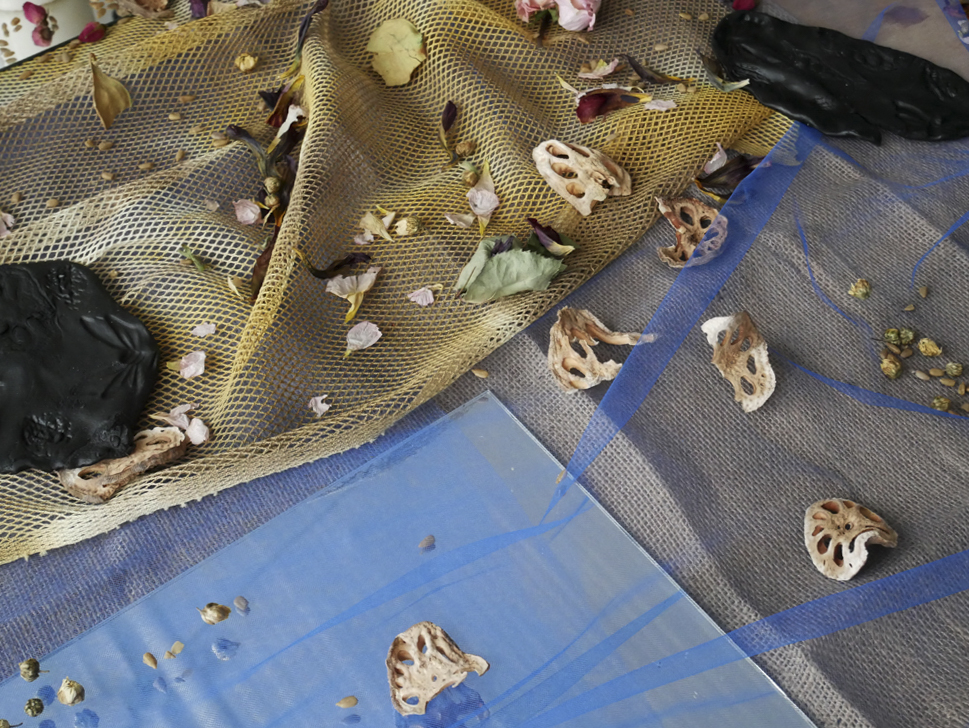Yaniya Lee is the author of Selected Writing on Black Canadian Art (2024, figure ground/Art Metropole) and Buseje Bailey: Reasons Why We Have to Disappear Every Once in a While, A Black Art History Project (2024, Artexte).
In 2025, Lee received her PhD in Gender Studies from Queen's University for her portfolio project “Black Art Study: Methods and Methodologies for a Black Studies Approach to Canadian Art History.” Among the projects she developed are the Black Canadian Art History Scholarship Database (blackartstudy.ca) and Doing the Work: Selected Syllabi (greyzonepedagogies.com).
She has published in journals and magazines including Racar: Canadian Art Review, C Magazine, Flash Art, Montez Press, and Asia Art Archive. In 2020 she co-edited a special issue of Canadian Art magazine on black artists and black art histories.
︎ yaniya@yahoo.com
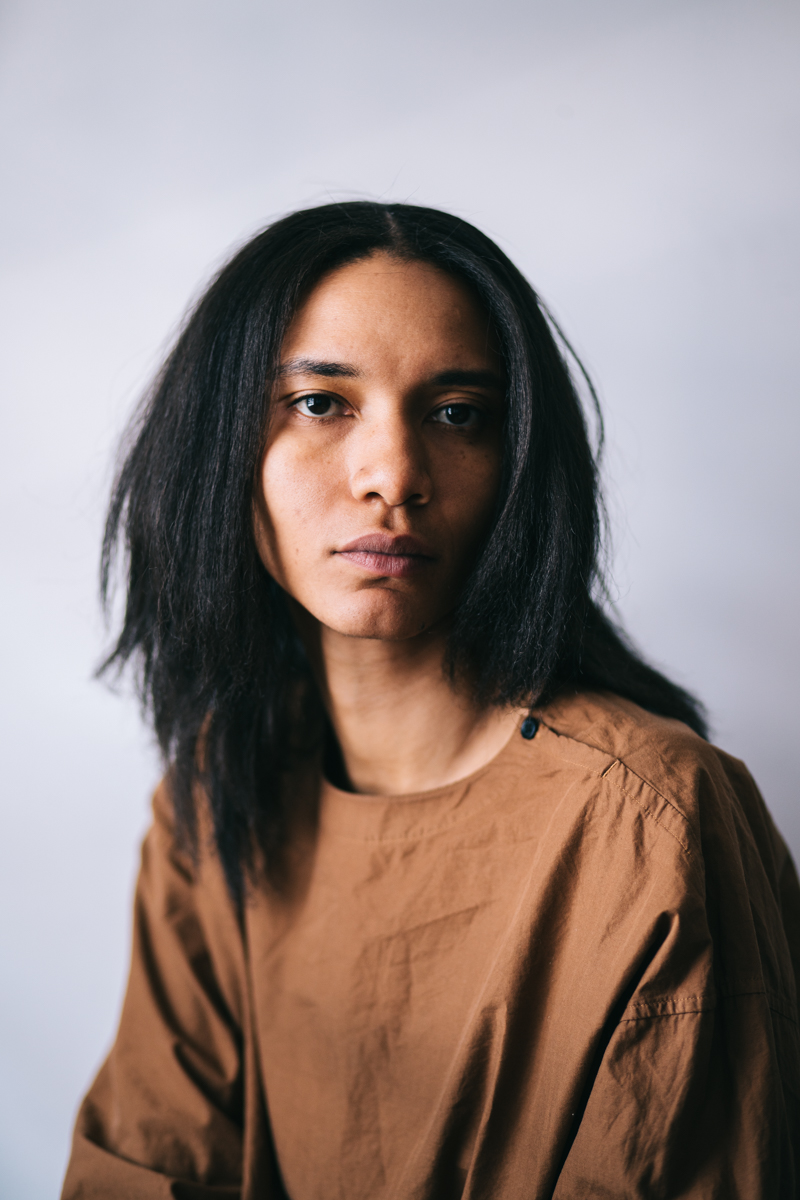
2025
“Image War on Reality,” curated video program for 2025 MOMENTA Biennale, based on catalogue essay
--Montreal screening + Q & A: October 29th, 6pm at Cinéma du Musée
--Kingston screening + writing workshop: November 3rd, 6pm at The Screening Room
“Medicine for a Nightmare,” essay in accompaniment of Raneece Buddan, AJA Louden, Garfield Morgan, and Elsa Robinson’s group exchibition New Routes: threads across space and time
at the Mitchell Art Gallery, Edmonton, Alberta (forthcoming)
Selected Writing on Black Canadian Art, book launch and conversation with Edna Bonhomme, Hopscotch Books, Berlin, Germany
Selected Writing on Black Canadian Art, book launch and conversation with Christina Battle, Magpie Books, Edmonton, Alberta
“New Methods for Black Canadian Art History,” public talk at the Mitchell Art Gallery, Edmonton, Alberta
“A Question of Power,” interview with Onyeka Igwe, Tate Etc. magazine, fall
“We Don’t Need Images What It Feels Like Is Good Enough,” catalogue essay for the 2025 MOMENTA Biennale d’art contemporain: In Praise of the Missing Image, Montreal, fall
“Wynter’s Toolbox: Notes from Artists and Scholars,” presented at the Sylvia Wynter and the Scales of the Human Symposium, ICI Berlin, summer
Buseje Bailey. Reasons Why We Have to Disappear Every Once in a While. A Black art history project by Yaniya Lee, Book Launch at Modern Fuel artist-run centre, Kingston, Ontario, Canada, summer
“An Artist Subverting Propaganda Through Large-Scale Sculptures,” interview with Sandra Poulson for Solo Show in The New York Times Style Magazine, spring
“Three of Dawoud Bey’s Favorite Artworks” for Solo Show in The New York Times Style Magazine, spring
“The Historical Entanglements of Hemel,” exhibition text to accompany Danielle Dean’s film Hemel, presented at Spike Island, Bristol, spring, 2025 and Mercer Union Gallery, Toronto, spring, 2024
2024
“Flood the World — Alvin Ailey,” and interview with curator Adrienne Edwards in JustSmile Magazine Issue 5, winter
“Some Other Shore,” exhibition text to accompany Racquel Rowe’s exhibition The Centre of the World Was the Beach exhibition at Forest City Gallery, London, winter
“Sugar – fragments of a narrative,” text to accompany Burnt Sugar, a group exhibition at Critical Distance Centre for Curators, fall
“Lyrical Theorising,” a profile of Alien Daughters Walk Into the Sun author Jackie Wang in Like a Fever for Asia Art Archive, summer
“Index,” with NourbeSe Philip, text in accompaniment of “A Smile Split by the Stars, An Experiment by Katherine McKittrick” at Gallery 44, Toronto, spring
“What does the land know?” curated program of short films, commissioned by Videographe and presented at Dazibao, Montreal, spring
“Methylene Blue,” text to accompany “New Paintings,” exhibition by Systems Research Group and Romain Löser at Guts Annexe, Berlin
“A Modern, Tragic Portrait of the Sea,” interview with Wardell Milan for On View in The New York Times Style Magazine
“The Black Artist,” reading at Bobshop, Berlin
what it feels like is good enough was a series of conversations about black and anti-colonial praxis inspired by the activities of artists and thinkers of the black radical tradition, and by Katherine McKittrick’s deep engagement with Sylvia Wynter. “I learned from [Sylvia Wynter] that sharing stories is creative rigorous radical theory,” McKittrick writes. “The act of sharing stories is the theory and the methodology.” Hosted every first Sunday of the month at the Archive Berlin space in the Wedding, this series intends to foster discussions about how we fashion our tools for liberation.
The tool is understood expansively. Like Harriet Jacobs’ gimlet, described above by Sandra Jackson-Dumont, these tools may be material or immaterial, they may be objects or concepts, spaces or songs, technologies or gestures. What these sticks, gimlets, and other tools share is that they are agentive; they enable tactics and strategies that can be wielded for our sustained freedom from fear, and toward joyous living.
Working with and from the efforts forged by previous generations, each activation will become a form of wayfinding. Invited artists and writers share their current work, their approaches to praxis, and the ongoing ways in which they navigate the assumptions, violences and extractive imperatives of the present world order. For the first four activations we will be joined by Mayra Rodríguez Castro, S*an D. Henry-Smith, Edna Bonhomme and Onyeka Igwe.
The tool is understood expansively. Like Harriet Jacobs’ gimlet, described above by Sandra Jackson-Dumont, these tools may be material or immaterial, they may be objects or concepts, spaces or songs, technologies or gestures. What these sticks, gimlets, and other tools share is that they are agentive; they enable tactics and strategies that can be wielded for our sustained freedom from fear, and toward joyous living.
Working with and from the efforts forged by previous generations, each activation will become a form of wayfinding. Invited artists and writers share their current work, their approaches to praxis, and the ongoing ways in which they navigate the assumptions, violences and extractive imperatives of the present world order. For the first four activations we will be joined by Mayra Rodríguez Castro, S*an D. Henry-Smith, Edna Bonhomme and Onyeka Igwe.
https://www.archivesites.org/2024/04/14/what-it-feels-like-is-good-enough-1/

The Scream and the Whisper
This audio essay is edited from two recorded conversations I had with Aisha Sasha John and Fan Wu about language and power, Blackness and signification, and strategising ways of being.
https://aaa.org.hk/en/like-a-fever/like-a-fever/the-scream-and-the-whisper/travelogue-baguio/1000/page/2
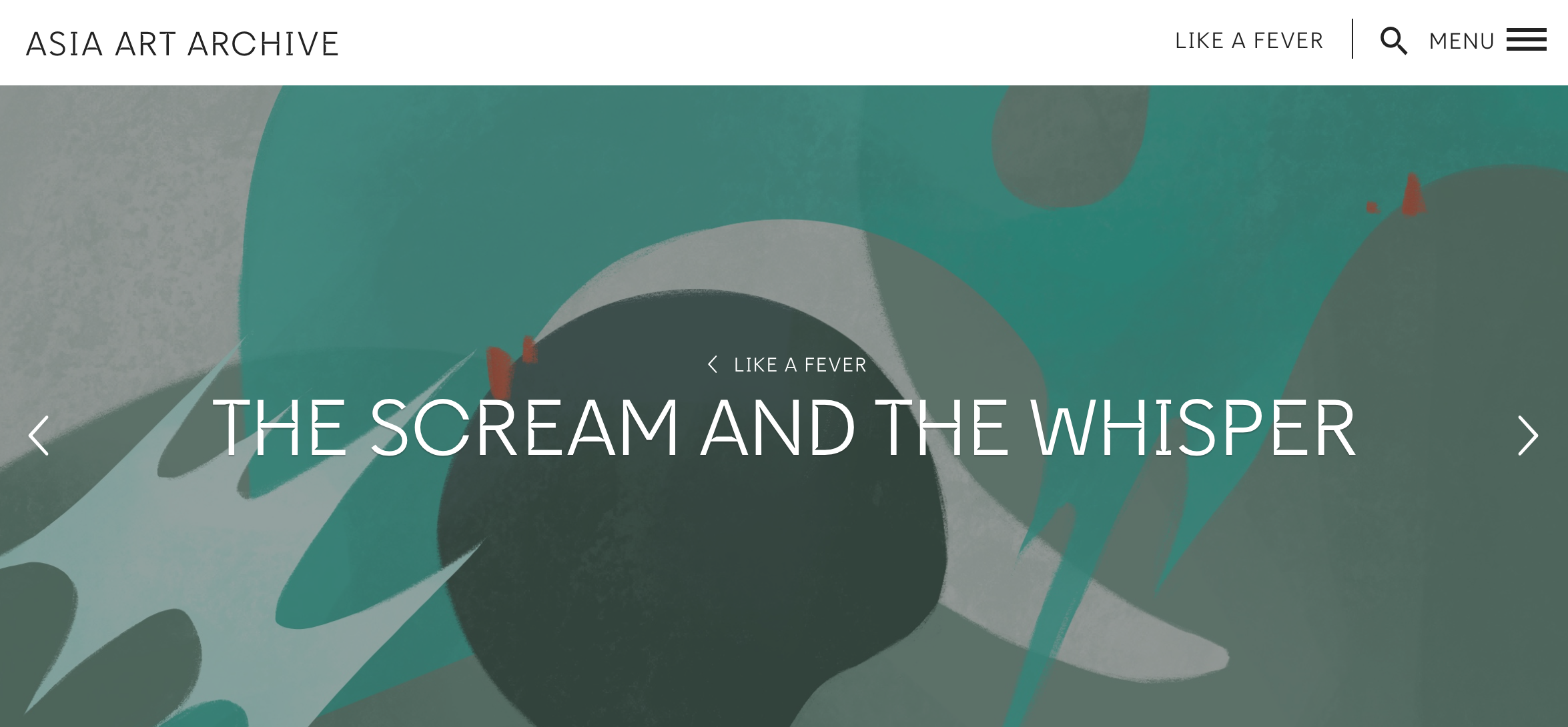
from the transcript:
Yaniya Lee (YL) [“Love Signal 528 Hz” begins playing]: Worlds open up when Katherine McKittrick talks with her friend Sylvia Wynter—“Friendship is hard freedom,” she says. “Maybe friendships effectuate consciousness and liberation and possibility.”* This edited together jumble of exchanges with my friends Aisha Sasha John and Fan Wu is my attempt to answer the question: What are the stakes involved in the act of naming? Like Katherine, I believe it is through these relationships that knowledge is made and shared.
Fan is a poet and scholar whose superpower is an ability to find the quickest way to get at the truth of a matter. Or the truth of a person.
Aisha is a poet and a dancer of quicksilver vibrancy. Like Fan, she relentlessly pushes for truth.
These two separate conversations, which I’ve shaped into a single, coherent piece of audio, are from my research on the relationship between language and power, originally commissioned by Christina Battle at BlackFlash, and here expanded for Paul C. Fermin at Asia Art Archive. As they were not originally intended to be public, you will hear the background sounds of our studios, and the scratching of my pencil as I take notes.
In any situation, in every context, I seek to understand how power operates. Fan and Aisha push, test, and experiment with words and naming to conjure different possibilities. This prompt, and my friends, have helped me consider language in new ways. I see that naming is a creative act. It creates worlds. It’s only harmful when some have the power to name, and others don’t.
From her world
“There are no parts,” (2022) is an exhibition of photographs by artists Nydia Blas, Widline Cadet, Jasmine Clarke, and Michèle Pearson Clarke that explore the complexity of Black girlhood, curated by Letticia Cosbert Miller at The Blackwood contemporary art centre .
In this audio composition created in response to the exhibition, Yaniya Lee holds a conversation on Black girlhood with her mothers, Grace Channer and Dzian. They each reflect on their childhoods to a soundscape mixed by Lee featuring music by Grace Jones.
Link to From her world audio composition:
https://www.blackwoodgallery.ca/projects/from-her-world
Link to transcription of From her world:
https://content.blackwoodgallery.ca/media/pages/projects/from-her-world/d248428a30-1654786225/from-her-world-transcript.pdf
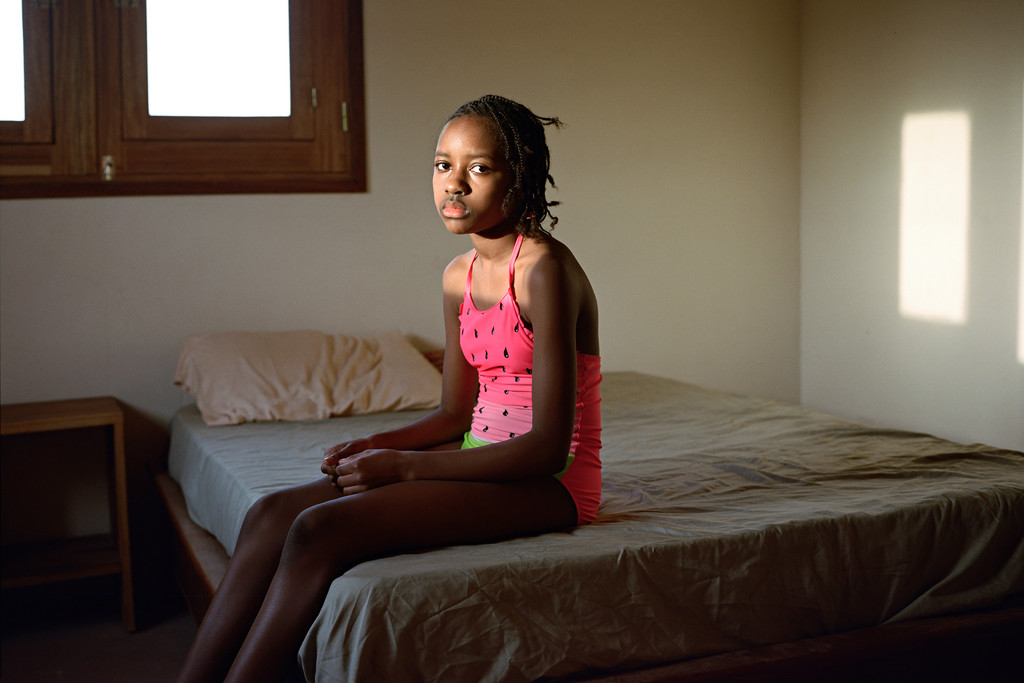 Jasmine Clarke, Watermelon Swimsuit, 2019.
Jasmine Clarke, Watermelon Swimsuit, 2019.
Black History Navigational Toolkit
2022 Toronto Biennial of Art
Camille Turner and Yaniya Lee worked together to develop a this project for the 2022 edition of the Toronto Biennial of art. Conceived as a deck of cards, The Black History Navigational Toolkit explores Black histories in the city of Toronto and beyond, with Turner and Lee drawing from personal experiences and often overlooked histories. They contextualize the chapters—neighbourhood, categories, and events—by outlining the critical histories and peoples that have influenced them. The project also exists in a different form as an online, interactive Milanote board. The online version present the cards with supplementary reading, watching, and listening in a non-linear way.
link to pdf of card deck:
https://torontobiennial.org/wp-content/uploads/2022/04/Black-History-Navigational-Toolkit-Booklet.pdf
Link to expanded milanote page:
https://app.milanote.com/1NkeRd10gpmO3K/black-history-navigational-toolkit?p=wCynEk6qf9w
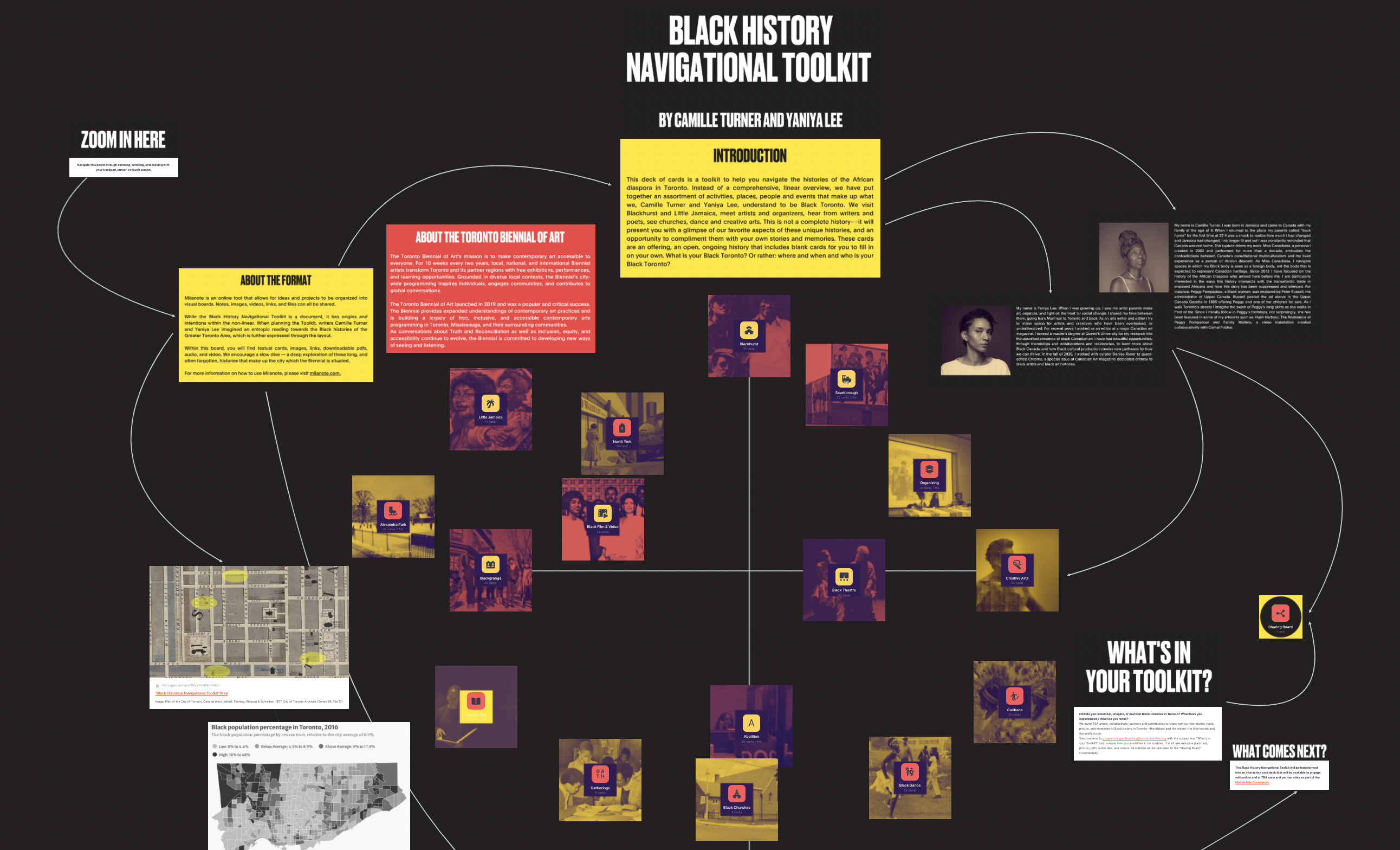
Ideas From Moving Water
Writing Workshop with Yaniya Lee
Free and online
Ideas From Moving Water is a writing workshop about the liberatory potential of Black creative practice. Based on the art and writing of Lorraine O'Grady, the workshop focuses on in depth conversations with contemporary curators and critics, including Lillian O'Brien Davis, Letticia Cosbert Miller and Tiana Reid, reading O'Grady's work across disciplines. A series of pre-recorded talks will precede a live, online writing workshop.
Creative prompts and a selection of readings—including texts from Lorraine O’Grady: Writing in Space, 1973–2019—will be made available in advance of each session. The live workshop is an opportunity for participants to discuss texts from the syllabus and share their responses to the prompts. There will also be a guided writing session.
Commissioned and presented by The Wattis Institute, as part of a year-long season dedicated to thinking about our contemporary moment through the lens of Lorraine O’Grady's work.
Live workshop on Zoom
April 14, 11am PST
RSVP: wattisrsvp@cca.edu

"WhAt She SaId": Promiscuous References & Disobedient Care with Yaniya Lee, Cason Sharpe, Zoe Sharpe
“Citations can be feminist bricks: they are the materials through which, from which, we create our dwellings.”
Sara Ahmed
When approached as praxis, the act of referencing becomes kaledescopic. How do we find, pull and build our references? How do we know where to look? Zoe Imani Sharpe, Cason Sharpe and Yaniya Lee are writers who are also siblings. Sparring, joking and caring for one another as kin, they know citation as an intimate endeavour, where the act of bringing together disparate materials is abundant and wayward. In this workshop, they share the development of their own collective canon and engage participants in collaborative writing that explores the resonances and contradictions of our personal reference banks.
Milanote Board and pre-recorded conversations: https://app.milanote.com/1LQmzz1Tv9m16b/what-she-said
Videos avalailable upon request.
Workshop:
June 23, 2021
Time: 11:00 AM (PST) // 2:00 PM (EST)
![]()
Song.Prayer.Scream. A Praxis Of Looking
Song. Prayer. Scream. A Praxis Of Looking is a writing workshop that asks us to consider the ways artists offer pathways of escape from everyday oppressions—sites of pleasure outside expected forms of work, gender, family and desire.“Citations can be feminist bricks: they are the materials through which, from which, we create our dwellings.”
Sara Ahmed
When approached as praxis, the act of referencing becomes kaledescopic. How do we find, pull and build our references? How do we know where to look? Zoe Imani Sharpe, Cason Sharpe and Yaniya Lee are writers who are also siblings. Sparring, joking and caring for one another as kin, they know citation as an intimate endeavour, where the act of bringing together disparate materials is abundant and wayward. In this workshop, they share the development of their own collective canon and engage participants in collaborative writing that explores the resonances and contradictions of our personal reference banks.
Milanote Board and pre-recorded conversations: https://app.milanote.com/1LQmzz1Tv9m16b/what-she-said
Videos avalailable upon request.
Workshop:
June 23, 2021
Time: 11:00 AM (PST) // 2:00 PM (EST)
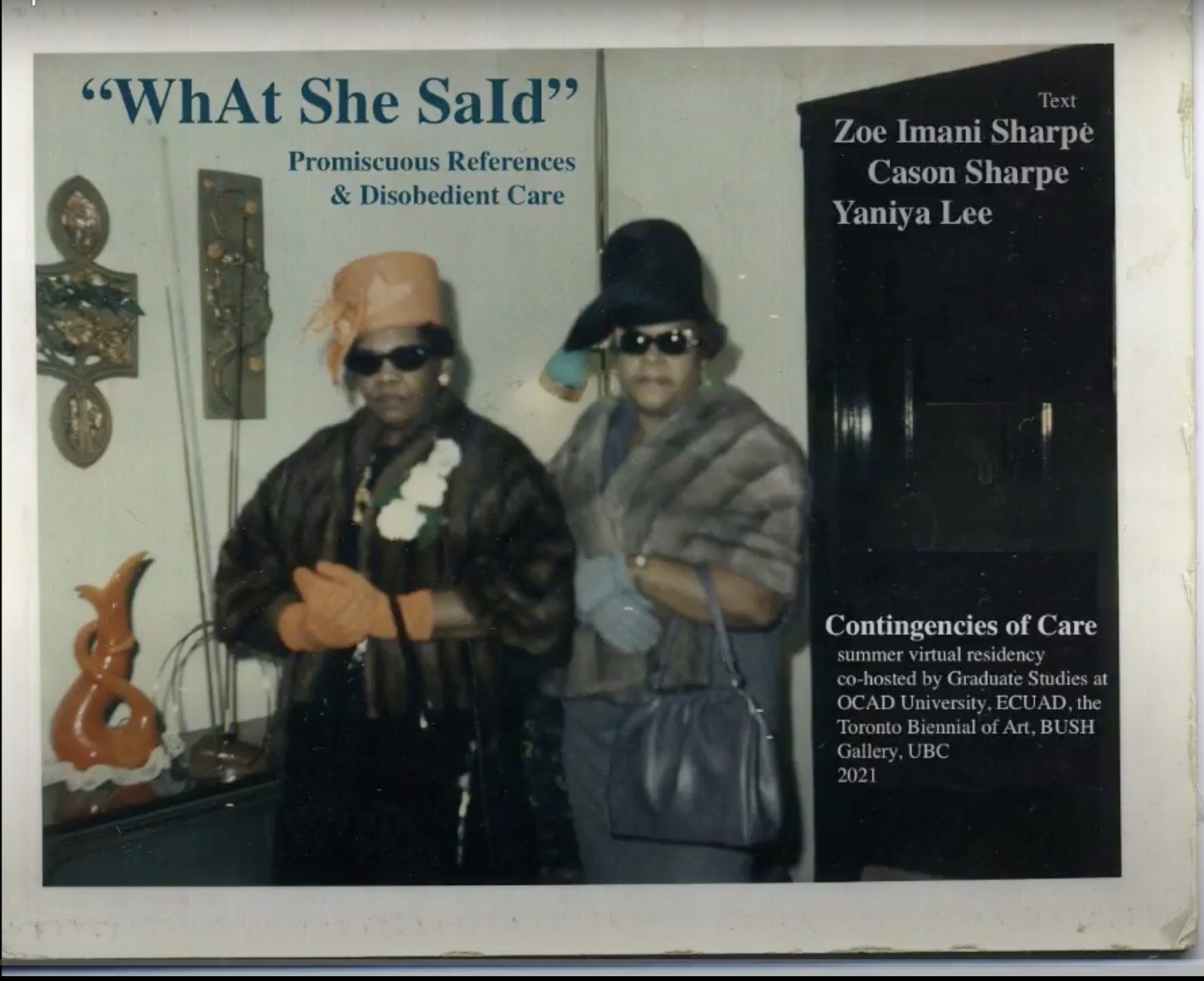
Song.Prayer.Scream. A Praxis Of Looking
led by Yaniya Lee & Jess Lynne
Each week, critics Yaniya Lee and Jessica Lynne will post a pre-recorded conversation that traces their thinking and questions around Blackness & Modernity, Black Technologies, Sousveillance, Repair & Healing & Pleasure. Theory, visual art, poetry, literature and music guide them through considerations of art criticism and new expansive ways of seeing.
Alexis Pauline Gumbs, Amber Jamila Musser, Aria Dean, Harmony Holiday, Edouard Glissant, M. Nourbese Phillip, Simone Browne and Sylvia Wynter, among others, act as Song. Prayer. Scream’s northstars.
You will be invited to respond to writing prompts and post related texts, art, video clips, poems, and songs to the Song. Prayer. Scream are.na page. Lynne and Lee will hold weekly office hours for talk back sessions to ask questions, discuss responses to workshop prompts, and continue the conversation.
March & April, 2021
Presented by Cassandra Press and hosted at the Women's Center for Creative Work
are.na page: https://www.are.na/kandis-williams/song-prayer-scream-a-praxis-of-looking
Videos avalailable upon request.

Chroma
Fall 2020 issue of Canadian Art Magazine
A year in the making, the fall 2020 issue of Canadian Art, available now, surveys the aesthetic practices and legacies of Black art production in Canada and beyond. Edited by Denise Ryner, writer and director/curator at Or Gallery, and Yaniya Lee, writer and features editor at Canadian Art, “Chroma” continues the work of “Bodies Borders Fields,” a 2019 symposium that reflected on how legacies of Black art and Black presence are omitted from Canada’s contemporary art narratives. With recent (renewed) institutional interest in Black Canadian art, and the twin pandemics of systemic racism and COVID-19 revealing how social inequality touches all sectors of life, how is Blackness being thought and rethought? In what ways are artists pushing for change? How does art address, and archive, these moments? Blackness, and Black creative practices, has survived through excesses and refusals; in “Chroma,” artists, writers and thinkers continue discussions that have too often been sidestepped in mainstream contemporary art publications—including this one.
Read “Excesses and Refusals,” an editorial note by Yaniya Lee and Denise Ryner, here:
https://canadianart.ca/essays/chroma-an-introduction/
Find some of the content online here:
https://canadianart.ca/issues/fall-2020-chroma/
Watch the launch here:
https://canadianart.ca/videos/chroma-launch-kelsey-adams-and-david-woods-in-conversation/
Revolution in Monogamy?
an online writing workshop
organized by Yaniya Lee and Fan Wu
as part of the Prairie Art Book Fair, 2020
COVID enforces a couples-as-exception rule to social distancing: so we wonder, maybe now’s as good a time as any to sign up for monogamy, despite our queer-bred skepticism. The myth of triumphant monogamy has resurged, even though it never really went away.
The current global uprising against police brutality and systemic racism has prompted outrage at inequities that have, like the couple form, remained a constant presence throughout our modern age. Recent protests have demonstrated that the myth of the end of racism has hopefully been definitively overturned.
Amidst this cyclical return of protest, now in context of a pandemic, the monogamy of the couple form resists the rupture. These protests have made other forms of collectivity seem more necessary and urgent. This means that the couple form emerges as counterproductive to the aims of protest and revolution.
Does coupling up mean you are denying your revolutionary spirit? What are the stakes of monogamy, and how do they overlap, clash, or conspire with the stakes of revolution? How do monogamous attachments delimit the terms of revolution?
In this discussion & writing workshop, we will be putting the two curious bedfellows of revolution and monogamy side by side. We will wonder together whether revolutionary politics requires a revolution within the structures of monogamy itself
Monogamy projects an ever-receding horizon of happiness, while revolution projects an ever-approaching rupture in social configurations. These two ideals lie at the very core of our affective and political fantasies. We will be reading excerpts from Frank Wilderson’s “The Black Liberation Army and the Paradox of Political Engagement” and Assata Shakur’s “To My People” alongside My King as exemplary texts on revolution and monogamy. This workshop only begins to scratch the surface of these fantasies’ entwinement.
https://plugin.org/exhibitions/yaniyalee_fanwu_2020pabf_event/

Rock Gardens
A Conversation Exploring Other Tangled Forms of Living Together
Morris and Helen Belkin Art Gallery, Vancouver, March 7, 2020
A performance reading by Lisa Robertson and Yaniya Lee for the Beginning with the Seventies symposium.
Watch documentation here:
https://belkin.ubc.ca/rock-gardens/

Bodies, Borders, Fields Symposium
November 22, 23 and 24, 2019
Toronto, Canada
A “simultaneous conversation” took place on August 16, 1967 between seven speakers in Toronto and New York with the cooperation of Bell Telephone Company, the CBC and artscanada magazine (formerly Canadian Art). This cross-border conversation was recorded and published in that year’s October issue of artscanada, which was, dedicated to “black” as a concept, painterly medium, symbol as well as socio-political category, expression and status.
Convened by Denise Ryner in collaboration with Yaniya Lee, Bodies Borders Fields is a free, public symposium that re-imagines the 1967 conversation about “blackness” with particular attention to blackness and fugitivity as represented in critical art practices today. Responding to an absence of black experience in the conversation between the 1967 panelists—an absence that has since been examined by writers Fred Moten, Krys Verrall and others—Bodies Borders Fields will dislocate the original panel discussion to contemporary contexts and representations of black and blackness in sound, performance and visual culture with respect to black social life and expression.
Find recordings of the talks and performances (under the resources tab) here:
https://www.bodiesbordersfields.com

Desire x Politics
a writing workshop
organized by Yaniya Lee & Fan Wu
at Mercer Union Gallery, 2019-2020
We want to begin to understand how desire and politics shape each other. Desire moves us through the world of relations with wild impulses and unconscious convictions. Politics is a practice of relationality, and its ideal is based on justice and reason. Desire and politics are never not at odds: insofar as politics is fundamentally relational and deals in power, and desire is fundamentally a lack that exceeds our will. Desire and politics are helplessly intertwined, hopelessly opposed. In this workshop we read and write together as a way to unravel the ways in which these two modes converge, diverge, enable and interrupt each other.
We work through a preliminary, though by no means exhaustive, set of questions: Where do politics and desire meet? Do they exchange awkward glances, fall into a duel, fumble their way toward embrace? Can we make desire Good and Right or does it retain its utmost state as moral chaos? How do my ethical beliefs shape my desires, my repulsions, my understanding of romance? Can my lust undermine the principles that structure my political ideals?
In the first part of this workshop we study the desire x politics configuration through psychoanalysis, Marxism, novelistic treatments of desire, poetics of white thirst, manifestos against monogamy, and tracts about new forms of contemporary intimacy. The syllabus is co-constructed by participants and takes the shape of our collective desires. As we read, we also closely study the forms this writing takes, and the ways in which these constructions influences our thinking about desire x politics.
In the second part of the workshop, we compose new writing work on desire x politics.
https://www.mercerunion.org/events/session-desire-x-politics/
https://www.facebook.com/events/mercer-union-a-centre-for-contemporary-art/call-for-participants-writing-workshop-on-desire-x-politics/407899243094174/
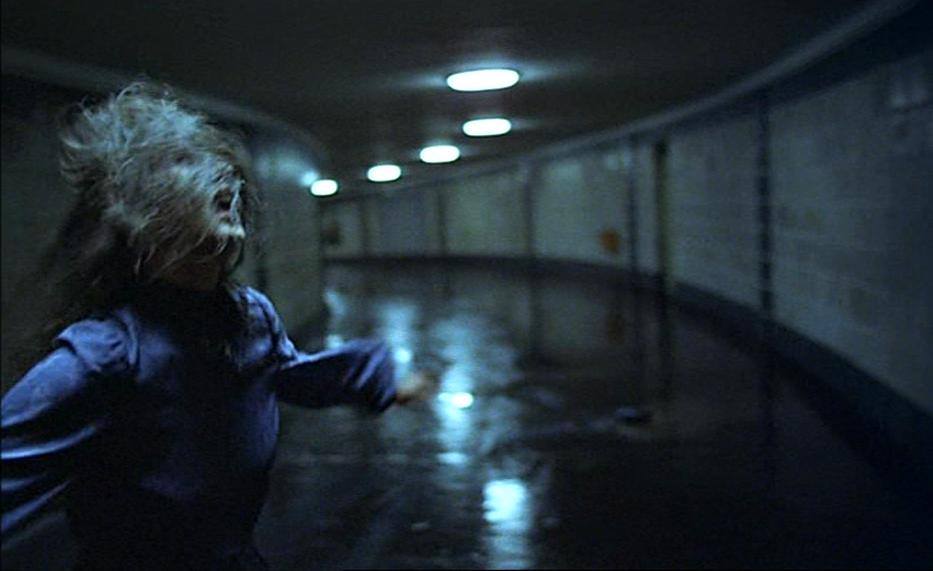
blue ferment: a intimate dinner performance by Laurie Kang and Yaniya Lee
The Table art space, Toronto, March 31, 2018
See documentation here:
https://www.thetable.info/laurie-kang-and-yaniya-lee
